Our recently-published article in the Yale Journal of Law & Technology is here: yjolt.org/patenting-ta...
08.02.2026 01:06 — 👍 1 🔁 2 💬 0 📌 0Our recently-published article in the Yale Journal of Law & Technology is here: yjolt.org/patenting-ta...
08.02.2026 01:06 — 👍 1 🔁 2 💬 0 📌 0
Looking for a listen that's about patents, but also pleasure and legality and changing social norms? @andrewgilden.bsky.social and I spoke to @kimkrawiec.bsky.social about "Patenting the Taboo: Sex, Drugs, and Abortion," on her excellent Taboo Trades podcast.
www.buzzsprout.com/1227113/epis...

Intellectual property produces pleasure. IP laws incentivize investment in popular culture, helping to ensure the viability of entertainment industries and the steady production of our favorite shows, cherished brands, and beloved celebrities. Across IP-heavy industries, creators cite the joy of writing, composing, coding, and experimenting as a motivation for countless hours in the office, studio, or lab. Nonetheless, in a broad range of settings, and across several areas of IP, courts have responded with hostility to personal accounts of pleasure in IP disputes. When a defendant admits to

using IP because they are fans of the plaintiff, or because they wanted to share their love of popular culture, or because it was simply alot of fun, courts cite such admissions as reasons for ruling against them. By contrast, when parties to IP disputes cite not to joy, pleasure, or fandom, but instead to anger, pain, and adversity, courts are far more receptive to such motivations for copying. When a defendant asserts that they copied aspects of the plaintiff’s work or brand because they felt alienated by it, or because they wanted to ridicule it, or because they wanted to insult the rightsholder, courts have embraced such motives as supporting fair use and free speech defenses. While sanctioning painful narratives may help artists expose the biases embedded in much popular culture, the judicial privileging of pain also has facilitated disempowering, mocking, blatantly hateful, or intentionally harassing portrayals of vulnerable individuals and communities. Moreover, by privileging pain over pleasure, IP law has limited the ability of marginalized groups—especially women, people of color, and queer people—to share their joy publicly. This Article shows that courts routinely undervalue pleasure and overvalue pain when resolving IP disputes. This “pleasure taboo” discourages honesty in litigation, disconnects IP doctrine from real-world creative practices, and skews IP’s moral compass. Insults and derision emerge as archetypes of fair use and free speech, while fandom and joy become commodities for rightsholders to harvest and control.
Final version of my article, Pleasure & Pain in Intellectual Property, now published in William & Mary Law Review! wmlawreview.org/pleasure-pai...
15.11.2025 23:39 — 👍 1 🔁 1 💬 0 📌 0Time to set up the Gay Church for Sex-Positive Parents of Gender Fluid Kids #scotus
27.06.2025 15:54 — 👍 3 🔁 0 💬 0 📌 0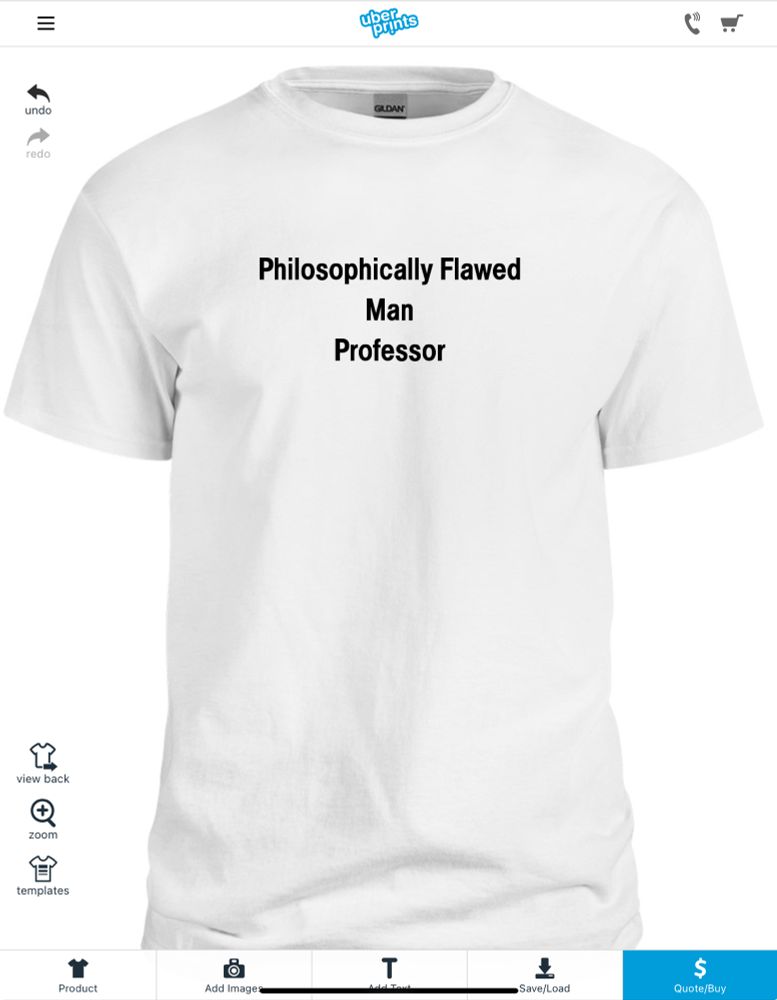 30.04.2025 17:23 —
👍 0
🔁 0
💬 0
📌 0
30.04.2025 17:23 —
👍 0
🔁 0
💬 0
📌 0
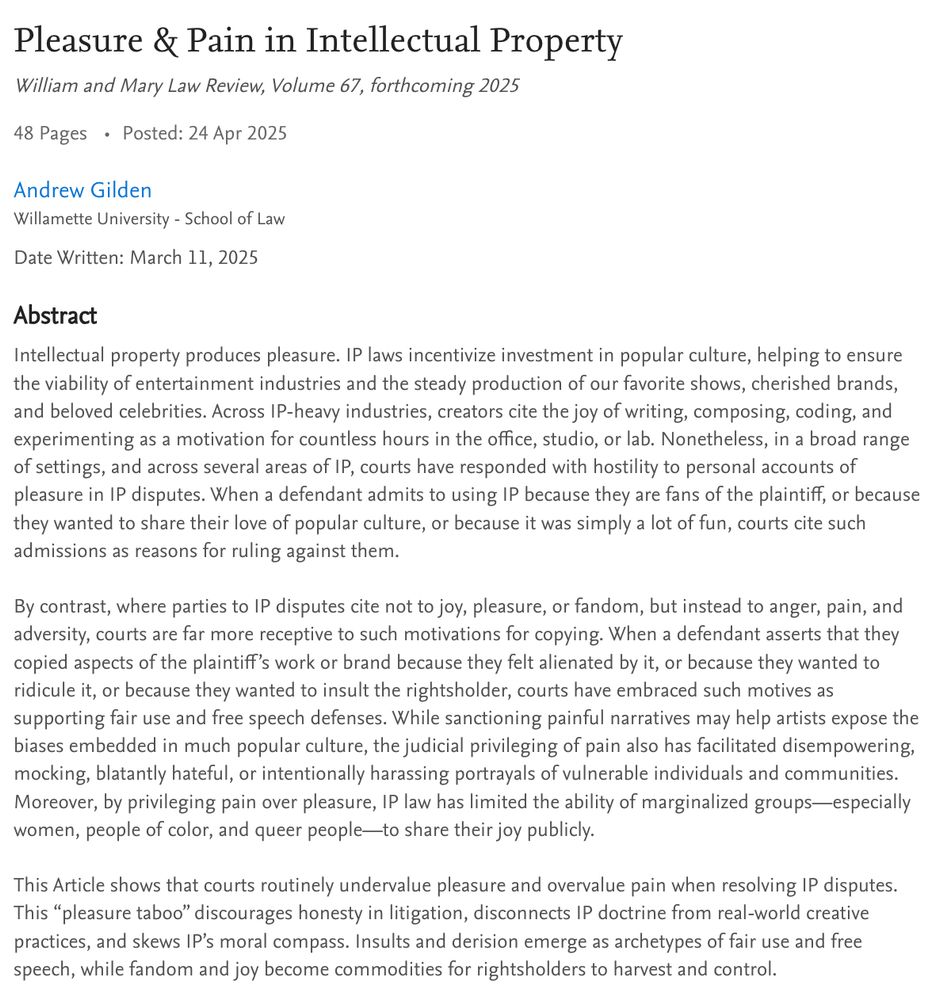
Intellectual property produces pleasure. IP laws incentivize investment in popular culture, helping to ensure the viability of entertainment industries and the steady production of our favorite shows, cherished brands, and beloved celebrities. Across IP-heavy industries, creators cite the joy of writing, composing, coding, and experimenting as a motivation for countless hours in the office, studio, or lab. Nonetheless, in a broad range of settings, and across several areas of IP, courts have responded with hostility to personal accounts of pleasure in IP disputes. When a defendant admits to using IP because they are fans of the plaintiff, or because they wanted to share their love of popular culture, or because it was simply a lot of fun, courts cite such admissions as reasons for ruling against them. By contrast, where parties to IP disputes cite not to joy, pleasure, or fandom, but instead to anger, pain, and adversity, courts are far more receptive to such motivations for copying. When a defendant asserts that they copied aspects of the plaintiff’s work or brand because they felt alienated by it, or because they wanted to ridicule it, or because they wanted to insult the rightsholder, courts have embraced such motives as supporting fair use and free speech defenses. While sanctioning painful narratives may help artists expose the biases embedded in much popular culture, the judicial privileging of pain also has facilitated disempowering, mocking, blatantly hateful, or intentionally harassing portrayals of vulnerable individuals and communities. Moreover, by privileging pain over pleasure, IP law has limited the ability of marginalized groups—especially women, people of color, and queer people—to share their joy publicly. This Article shows that courts routinely undervalue pleasure and overvalue pain when resolving IP disputes. This “pleasure taboo” discourages honesty in litigation, disconnects IP doctrine from real-world creative practices, and skews IP’s mora…
New paper: Pleasure & Pain in Intellectual Property, forthcoming in William & Mary Law Review 🥳
papers.ssrn.com/sol3/papers....
Um, these product names??
28.03.2025 17:45 — 👍 3 🔁 0 💬 1 📌 0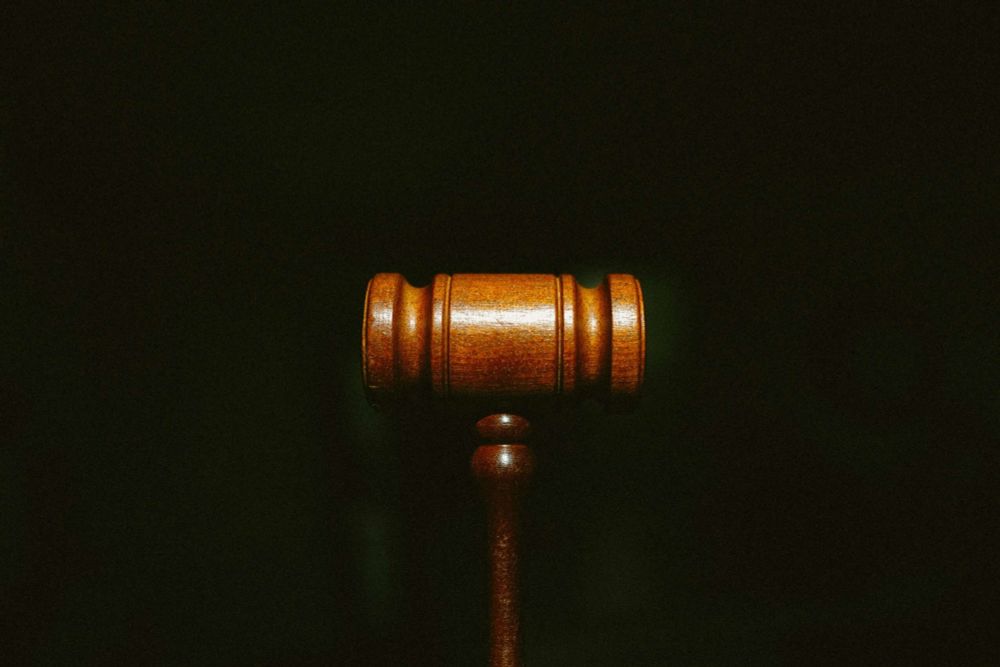
States are moving in the wrong direction on prostitution laws reason.com/2025/03/26/t...
12 states are mulling harsher penalties for trying to pay for sex
Many of the proposals would raise it from a misdemeanor to a felony. Some would make those convicted register as sex offenders.
It’s giving Blackstone
09.03.2025 14:42 — 👍 2 🔁 0 💬 0 📌 0
A new bill by OK's Dusty Deevers criminalizes drag in public, with mandatory prison time. The bill, SB550, uses "harmful to minors" designation — the same language being used to ban adult sites via age-verification.
SB550 has passed out of committee and headed for a full Senate vote.
Last night I dipped into queer twitter to see reactions to the (incredible) Grammys--the outpouring of joy drowned out the national politics for the first time in awhile. Was a reminder of the shared joy that platform has provided, and the potential for resilience in the face of Mr. Tesla.
03.02.2025 17:48 — 👍 2 🔁 0 💬 0 📌 0
Honored to kick off Rutgers Year of the Arts today with my talk "How IP Law Shapes Popular Culture and the Creative Process." I will be discussing my research on pleasure in the IP system and the importance of diverse pleasure narratives in pop culture. Joy is power!
go.rutgers.edu/izuorre9
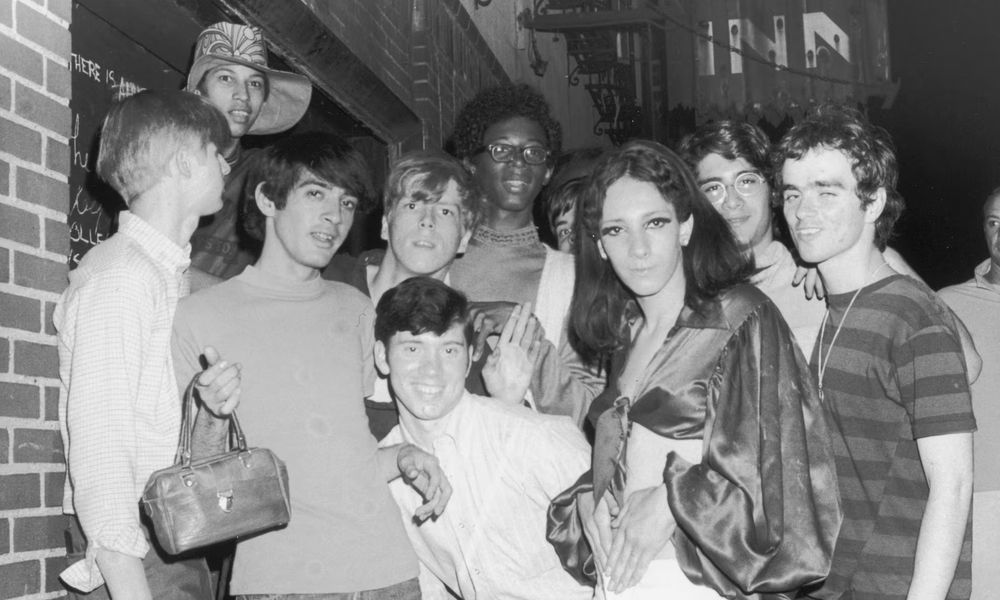
This is my favorite picture of Stonewall.
They knew they were getting arrested just for being LGBTQ+.
Yet... they're still here, standing outside of the boarded up Stonewall Inn, smiling as the world was at a fever pitch of hatred against them.
I think about it a lot in moments like this.
If you see this, post a fictional band you would love to see live
27.01.2025 16:00 — 👍 0 🔁 0 💬 0 📌 0A reminder that we have a ~20 yo circuit split on whether “obscene device” laws are constitutional.
17.12.2024 18:01 — 👍 0 🔁 0 💬 0 📌 0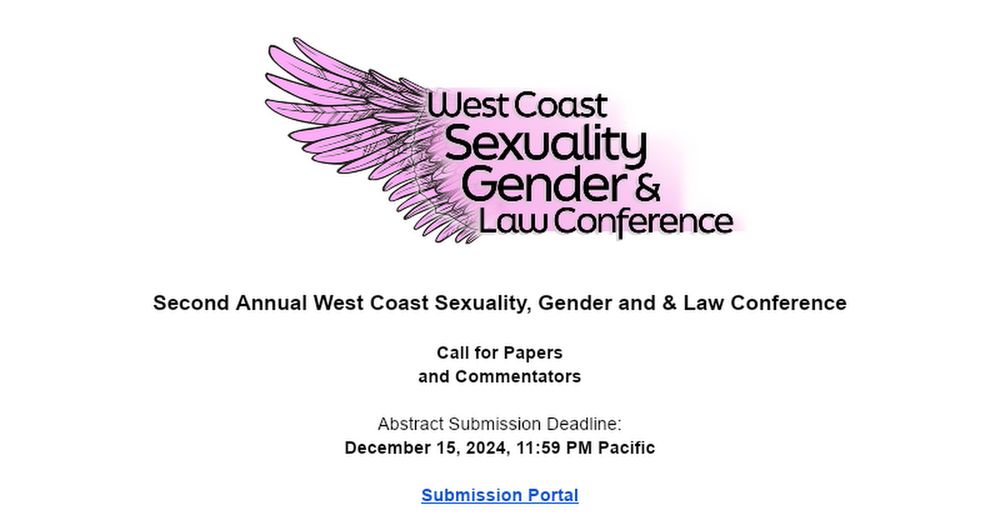
Join me and a bunch of other sexuality, gender & law scholars at UC Irvine in February! Deadline for proposals is Dec 15.
docs.google.com/document/d/1...
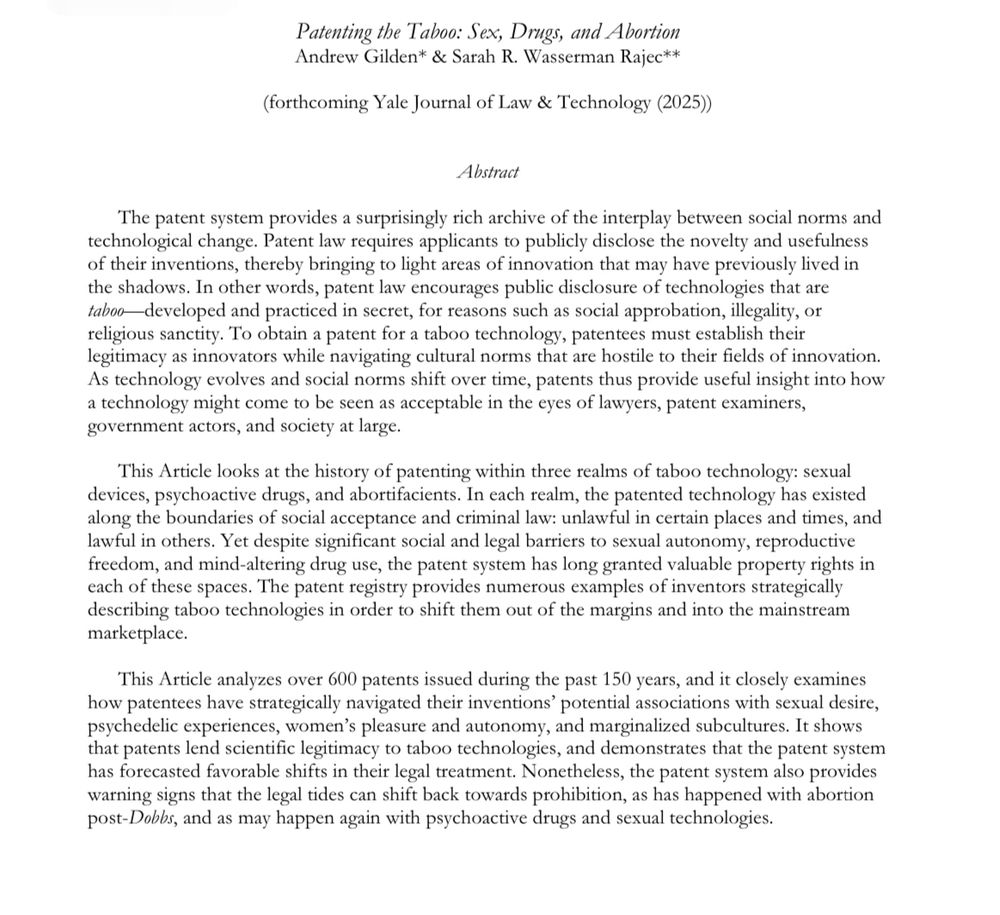
Excited to share my new article with @sarahrajec.bsky.social: Patenting the Taboo: Sex, Drugs, and Abortion, forthcoming in Yale Journal of Law & Technology. Feedback welcome!
papers.ssrn.com/sol3/papers....
Would love to see a draft!
13.11.2024 15:53 — 👍 0 🔁 0 💬 1 📌 0
“A personal injury law firm is actively courting plaintiffs in Kansas, using the state’s age-verification law to dangle the prospect of large financial judgments from adult companies. The firm is employing church networks to reach potential plaintiffs.” www.freespeechcoalition.com/blog/attorne...
13.11.2024 15:19 — 👍 16 🔁 10 💬 3 📌 0